Topic 1: A special counsel investigation reality check: Less about Russia, more about indictments. What are they hiding? That’s the question Americans want answered, especially when told the investigation has already led to numerous indictments – something many people don’t actually know.
Topic 2: The cabinet scandals: A waste of taxpayer dollars. Most Americans do not know their Pruitt from their Mnuchin, but private jets and honeymoon travel are widely viewed as unacceptable.
Topic 3: Congressional oversight: “Party over country” is the big problem. When it comes to oversight over the Trump administration – on both the investigation and the Cabinet – the public is most troubled by congressional Republicans putting party over country.
Topic 4: On #MeToo, Americans say “both” – as in, both parties should lead. And women across party lines are paying closer attention than men. Sexual misconduct by people in power is a problem for both parties, Americans agree on that. But party and gender drive real differences.
1 | The Special Counsel Investigation
Americans want the investigation to continue, but are more interested in indictments and crimes than in rehashing 2016.
For many Americans, the cover up is the crime. When we ask Americans what this investigation is about, they say it’s about Russian interference and collusion rather than obstruction of justice and cover-up by a 14-point margin. But when we ask them what concerns them most about the investigation, it’s the potential for cover-up or obstruction of justice that worries people most (by 7 points overall and 12 points with independents).
Americans want the special counsel investigation to continue rather than be shut down, by a 55% to 35% margin. Even among whites without a college degree – 56% of whom approve of the president – just 44% believe the investigation should be shut down. However, there are still warning signs when it comes to public support for the investigation. The public is divided over how Mueller has handled it, and when President Trump and Republicans argue to shut it down, some counter-arguments are more persuasive than others.
Americans are more persuaded when it is pointed out that the investigation has yielded 22 indictments or guilty pleas, or when it is argued Trump should let the investigation continue if he’s done nothing wrong and that no one is above the law – not even the President of the United States. Importantly, these arguments are considered persuasive by two-thirds of independents. It’s less convincing to counter that ending the investigation would encourage more Russian meddling, or to simply appeal to the credentials of the investigator, special counsel Robert Mueller.
What is Trump hiding? If he’s done nothing wrong, let the investigation finish.
This is powerful language that beats “it’s time to end it” argument by a huge margin.

22 indictments or guilty pleas.
Showing results matters, and relates back to the argument above. If Trump has done nothing wrong, then why have there been so many indictments and guilty pleas?

Centering the argument on Russian meddling and Mueller is less effective.
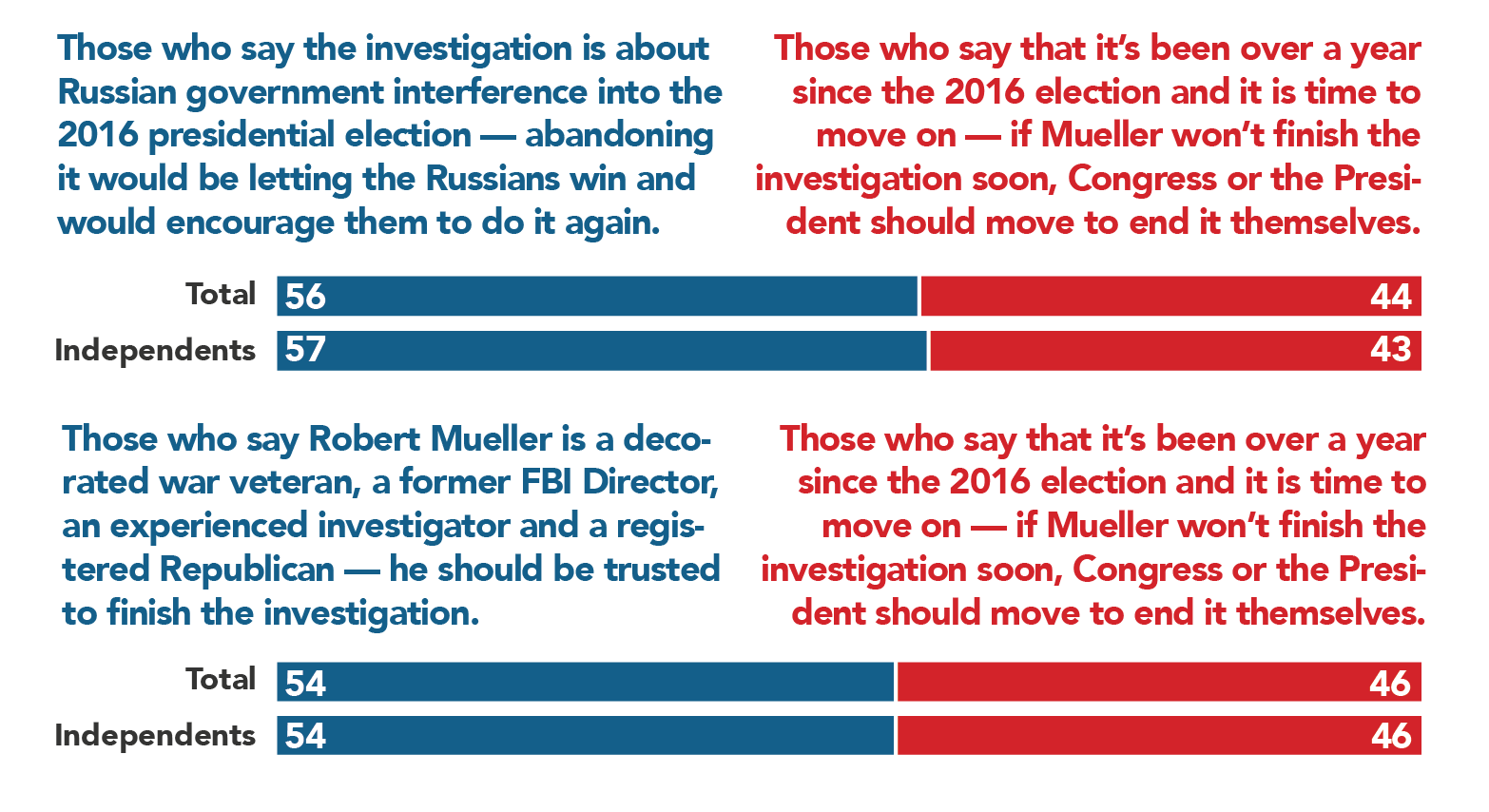
Known unknowns
It may feel as if news about the investigation has reached saturation, and in one way, that’s true: 97% of Americans have heard at least a little about it, and half have heard “a lot.” But despite the indictments and guilty pleas by some of Trump’s top campaign aides, a majority of Americans answer “no” when asked whether the investigation has uncovered any crimes. For those trying to connect with Americans about the investigation and its future, an important first step is reminding them it has already resulted in serious criminal charges for people very close to Trump.
Half the story.
Eighty-one percent have heard more than a little bit about this investigation, but half that number appear aware of – or make the connection to – the numerous indictments and guilty pleas issued so far.
As you may know there is currently an investigation going on right now into Donald Trump’s 2016 presidential campaign and any Russian government involvement in the 2016 election. How much have you heard about this investigation?
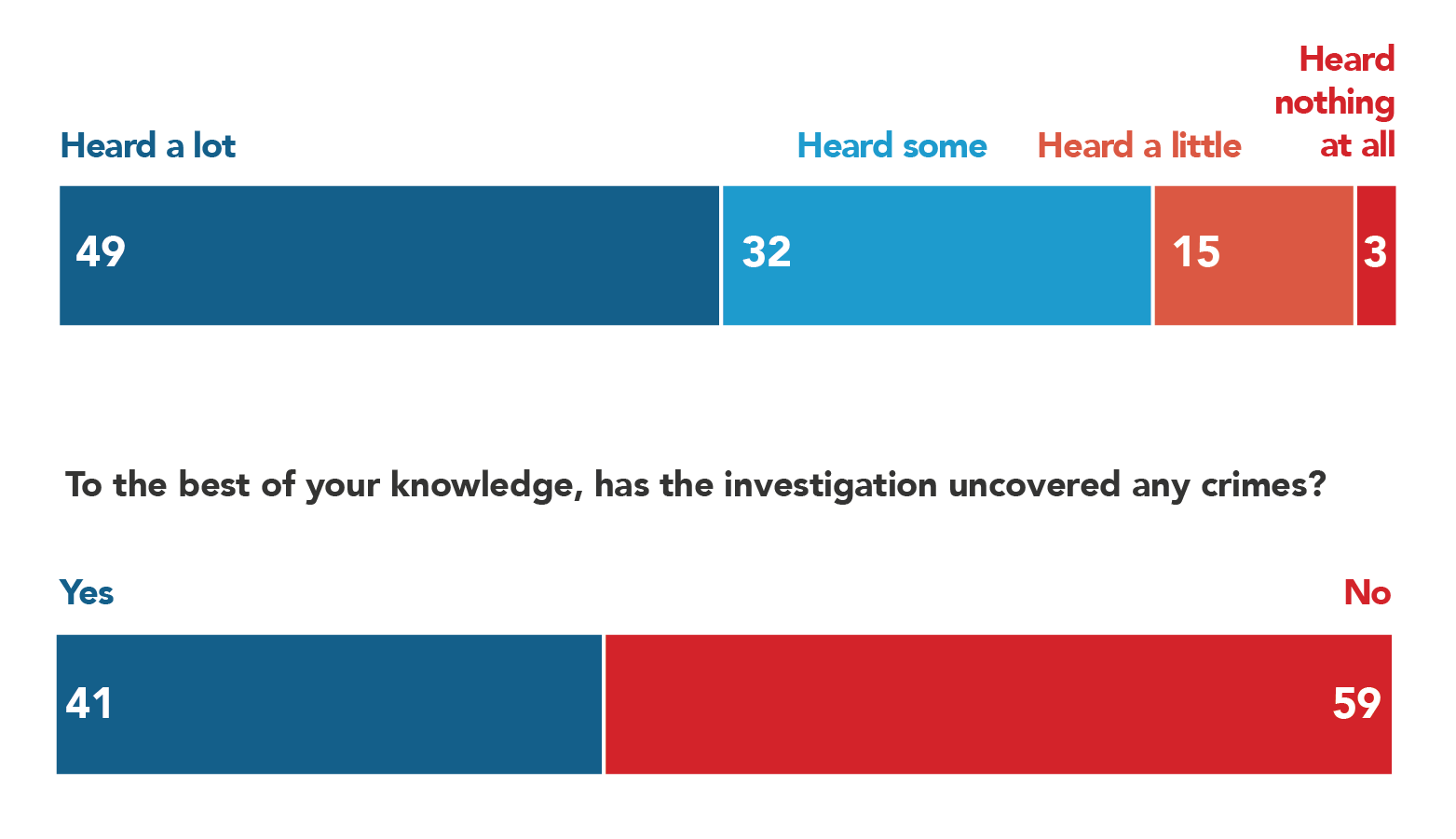
Lifting Robert Mueller above the fray
Robert Mueller is a polarizing figure – just like most other people and institutions in Washington. Mueller’s favorability rating is mixed, and the public is split on whether he has handled the investigation well. But he has been under persistent attack by some on the right, and as the face of the investigation, progressives need to counter with validating characterizations of him. The most effective ways to describe him are as an “experienced former federal prosecutor” and to depolarize him by reminding the public he served as FBI Director under both George W. Bush and Barack Obama. Notably, his cross-partisan credentials are more effective than calling Mueller a “lifelong Republican” – even among Republicans.
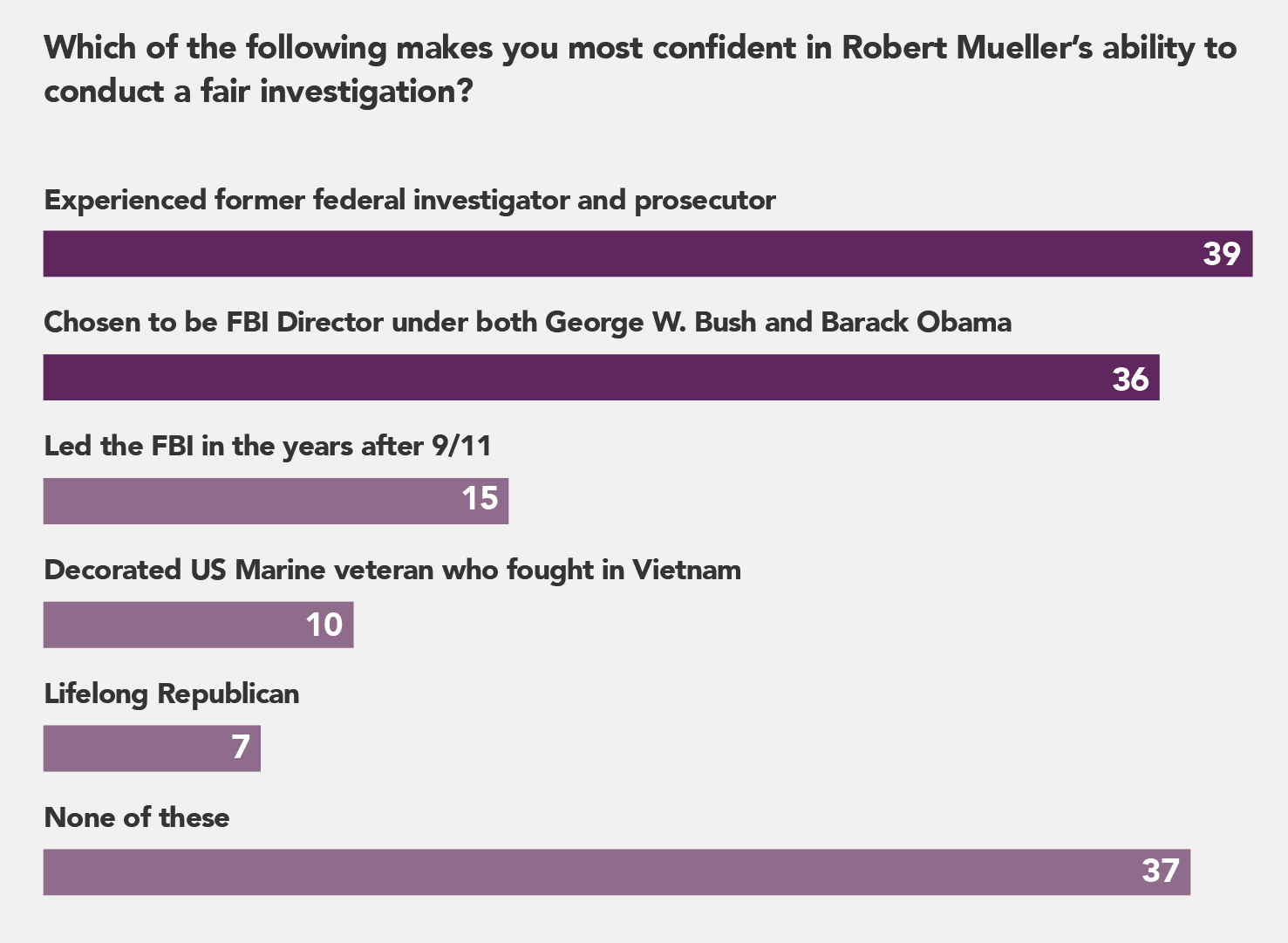
2 | Cabinet Scandals
What troubles Americans most about the Trump Cabinet scandals – and government oversight failures – is the waste of taxpayer money.
Scott Pruitt. Tom Price. David Shulkin. Steve Mnuchin. Ben Carson. The scandals are adding up, and Americans say the part of it that bothers them most is that the price tag is adding up too. When it comes to these scandals, concern about wasted taxpayer money outstrips other concerns.
When getting into specifics (but without naming names), many of the stories that strike Americans as beyond politics- as-usual involve members of the Trump Administration using public money as their personal tab, especially in relation to personal travel. There does appear to be a distinction between use of taxpayer dollars for clearly personal purposes – like a honeymoon or a vacation in Europe – and taking personal favors like a discount rental rate or a ticket to Wimbledon.
Scott Pruitt is making a name for himself.
No single cabinet official is yet the poster child for spending tax dollars on personal items, but EPA Administrator Scott Pruitt starts to come close. Twenty-seven percent of Americans cite Pruitt as the Trump Administration figure whose actions have been most concerning, followed by Treasury Secretary Steven Mnuchin at 15% and HUD Secretary Ben Carson at 10%.
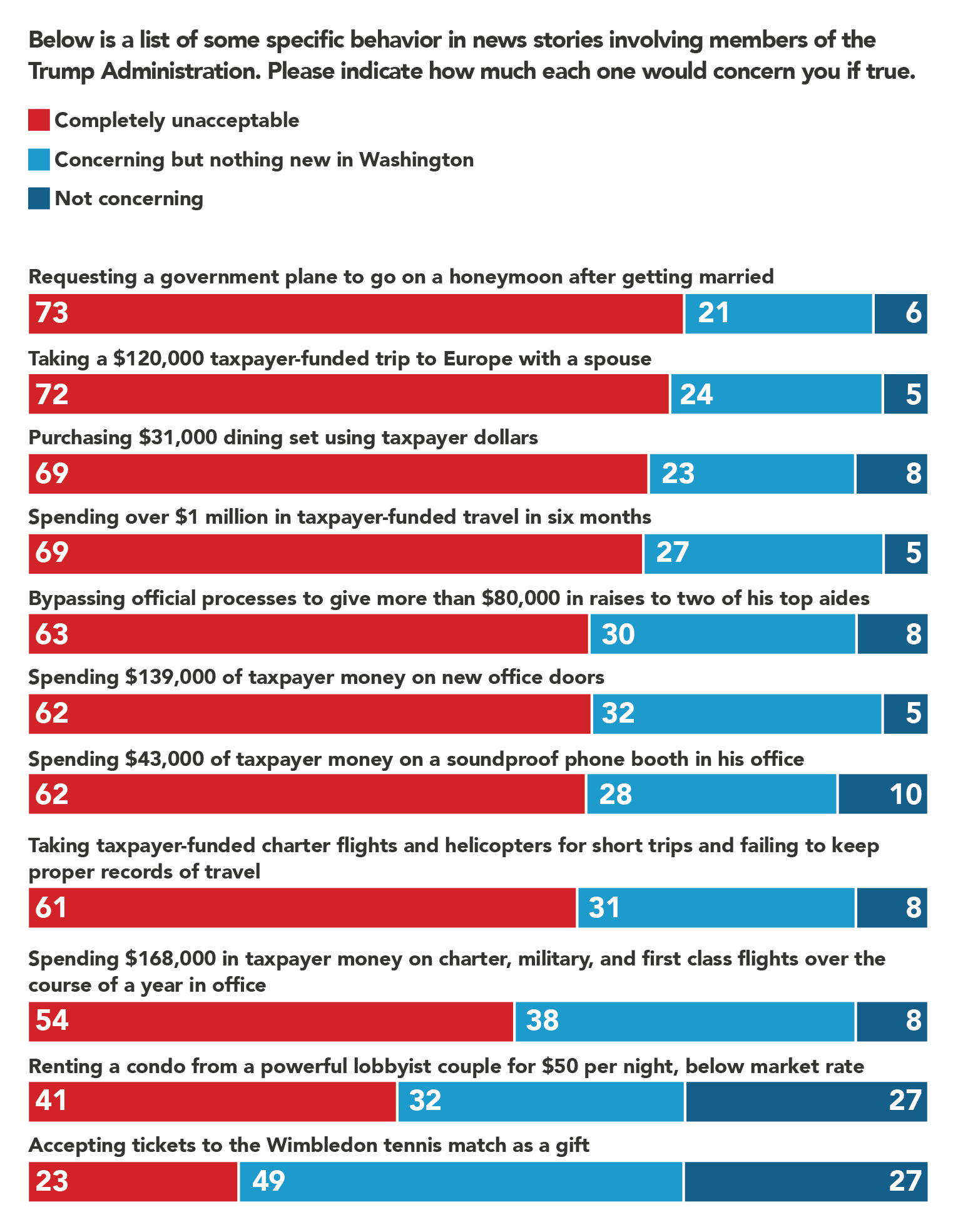
3 | Congressional Oversight: Putting Party Over Country
Trump Scandals, The Investigation, The Cabinet: What does Congress have to do with it?
Americans want oversight over the Trump Administration to take place, but most are disinclined to believe Republicans can offer it. Whether it’s the Mueller investigation or holding the Trump Administration accountable in general, most Americans have little faith in congressional Republicans.
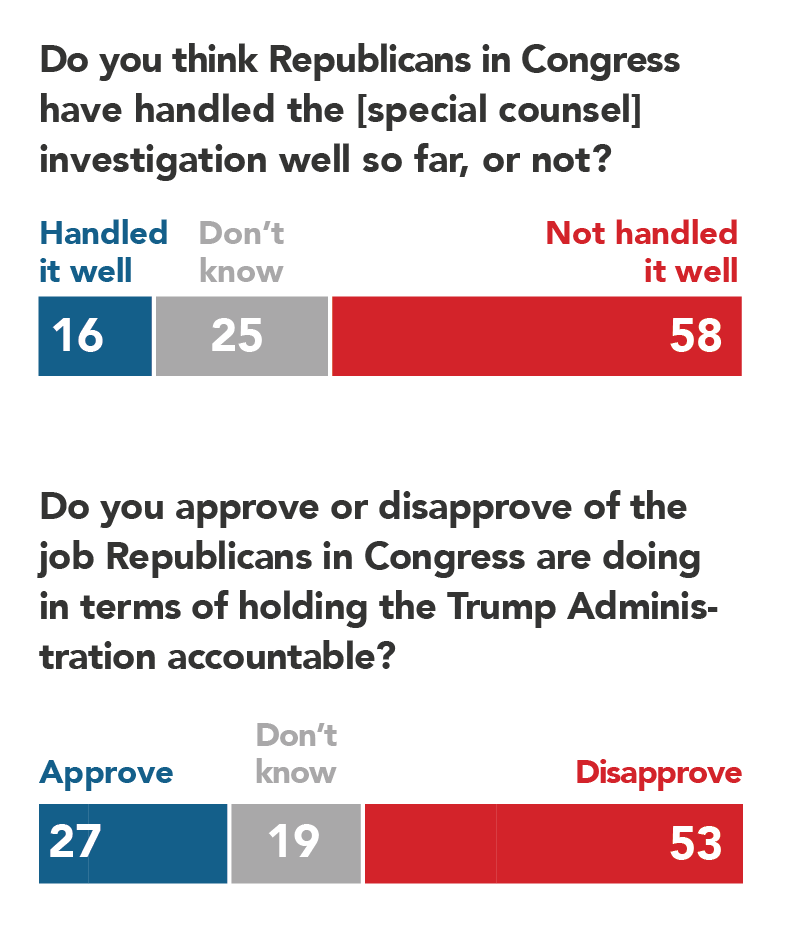
Party over country
At the heart of Americans’ frustration with accountability and oversight is a sense some in Congress are putting party interests ahead of their duties to the country. This is true for Cabinet scandals and the Mueller investigation.
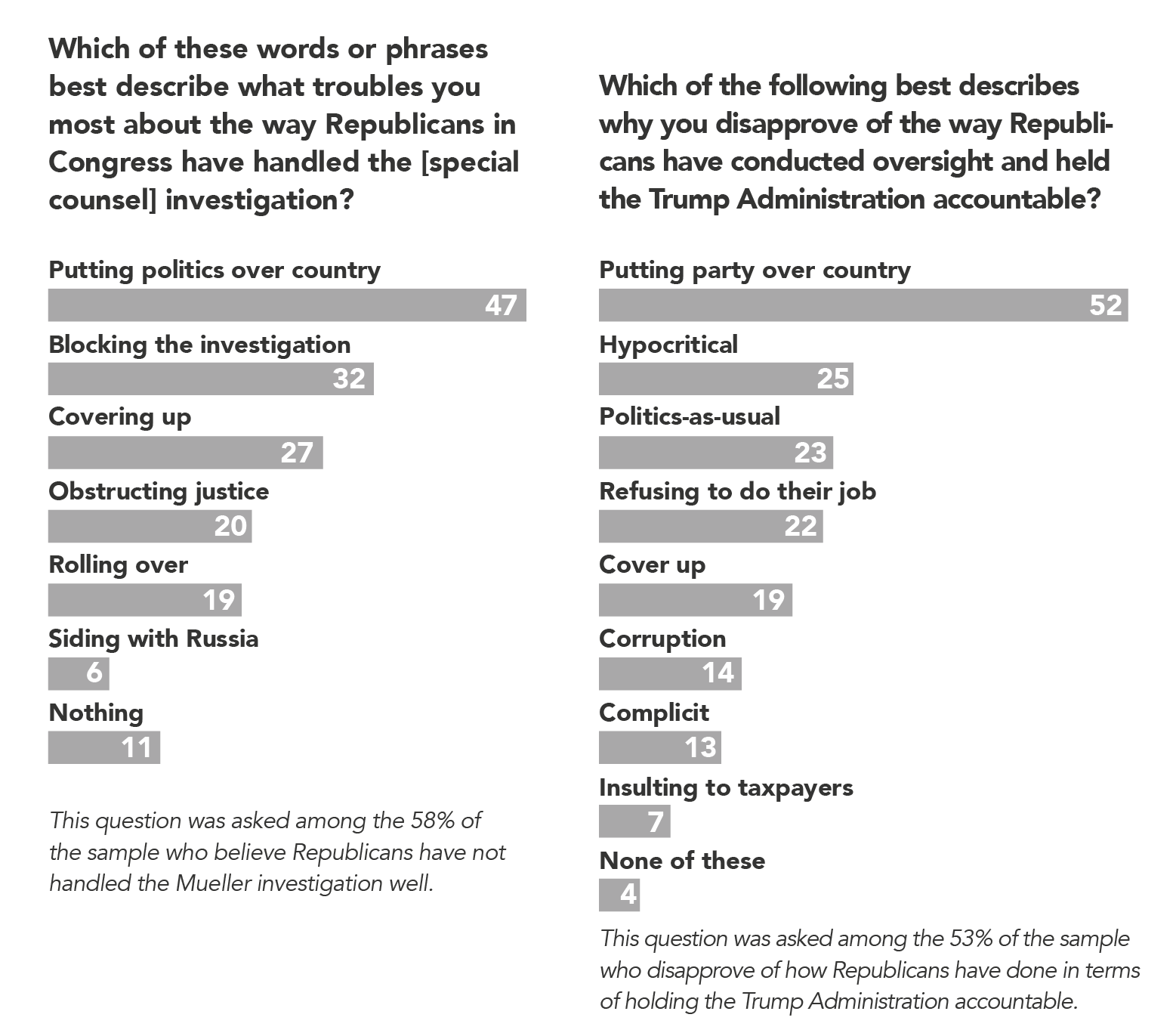
What else are they hiding?
Pushing the idea that politicians are covering up secrets shouldn’t be limited to how we talk about the Mueller investigation. It extends into all forms of oversight of the Trump administration and Congress. Public trust in government and elected officials is extremely low, as research elsewhere has repeatedly shown. As such, our survey also found it effective to allude to “cover up” language in calling for more accountability:
That the Republicans are blocking these investigations and refusing to do real oversight over the Trump Administration because Republicans in Congress are guilty of some of the same abuses themselves.
That the Republicans are blocking these investigations and refusing to do real oversight over the Trump Administration because they think it is more important to protect the same wealthy corporate donors who fund their campaigns and have ties to the Trump Administration.
4 | The Politics of #MeToo
Americans do not see sexual misconduct as a partisan issue, but that doesn’t mean they trust each party equally.
Last month, we found “using public money to settle workplace disputes, including sexual harassment” ranked second on a long list of different ways members of Congress might misuse their power. It surprised us how prominent #MeToo was on this list – and that led us to dig deeper this month. What drives these concerns, and do they apply to both parties’ leaders equally?
It turns out Americans see one party as most culpable, but would prefer both act responsibly. Americans do not see this as a partisan issue that can only be solved by one political party. When forced to choose, they do see it as a problem of sexual misconduct and lack of accountability more closely aligned with Trump and other elected Republicans – especially Trump himself.
If progressives are going to credibly lead this fight, they will need to meet voters where they are, and the data suggests this means acknowledging members of Congress on both sides of the aisle have real work to do, starting in the U.S. Capitol Building.
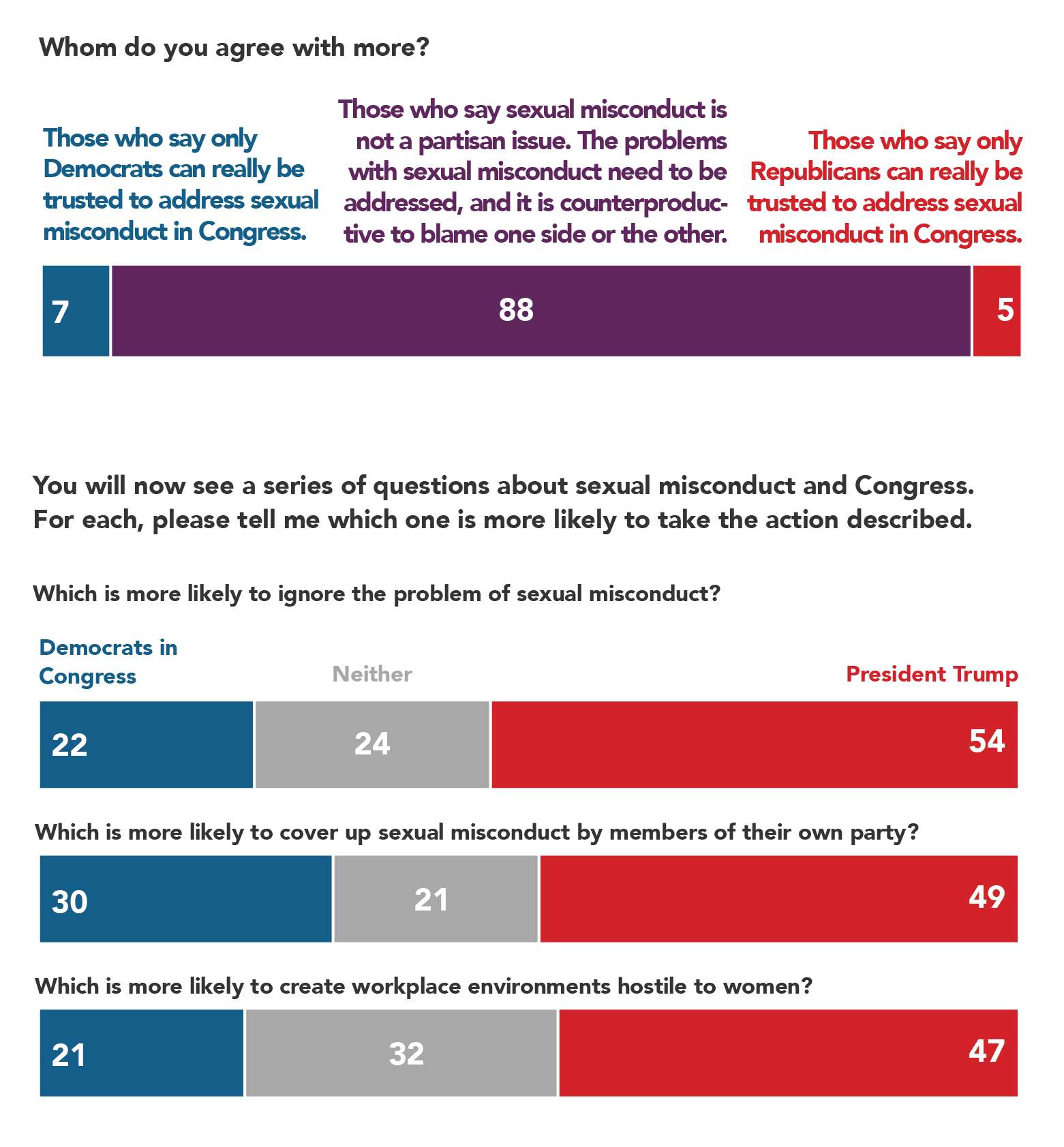
Electing more women
For many Americans, there is an obvious solution to rampant sexual misconduct among public officials: elect more women. Democratic women and independent women are particularly likely to see harassment as a widespread problem and not just a few bad apples, and majorities of both these groups think 1) too many men are in power and 2) want to elect more women as a result.
There are clear divisions by both gender and party. For example, majorities of Democratic women (71%), Democratic men (59%) and independent women (54%) say they are more likely to support women for elected office as a result of sexual misconduct among elected officials. But among independent men (32%), Republican women (23%), and Republican men (18%), the numbers are far lower.
Another difference: while Democrats tend to see sexual misconduct among members of Congress as more of a hypocrisy issue (politicians talk about upholding family values, but they don’t live it) Republicans tend to see it as a corruption issue (politicians are settling sexual harassment disputes in secret, and leaving taxpayers with the bill).
The numbers among Democrats should come as no surprise to those monitoring election results this year, but the numbers among independent women are striking – suggesting energy for women candidates may translate to elections this fall among a critical swing constituency.
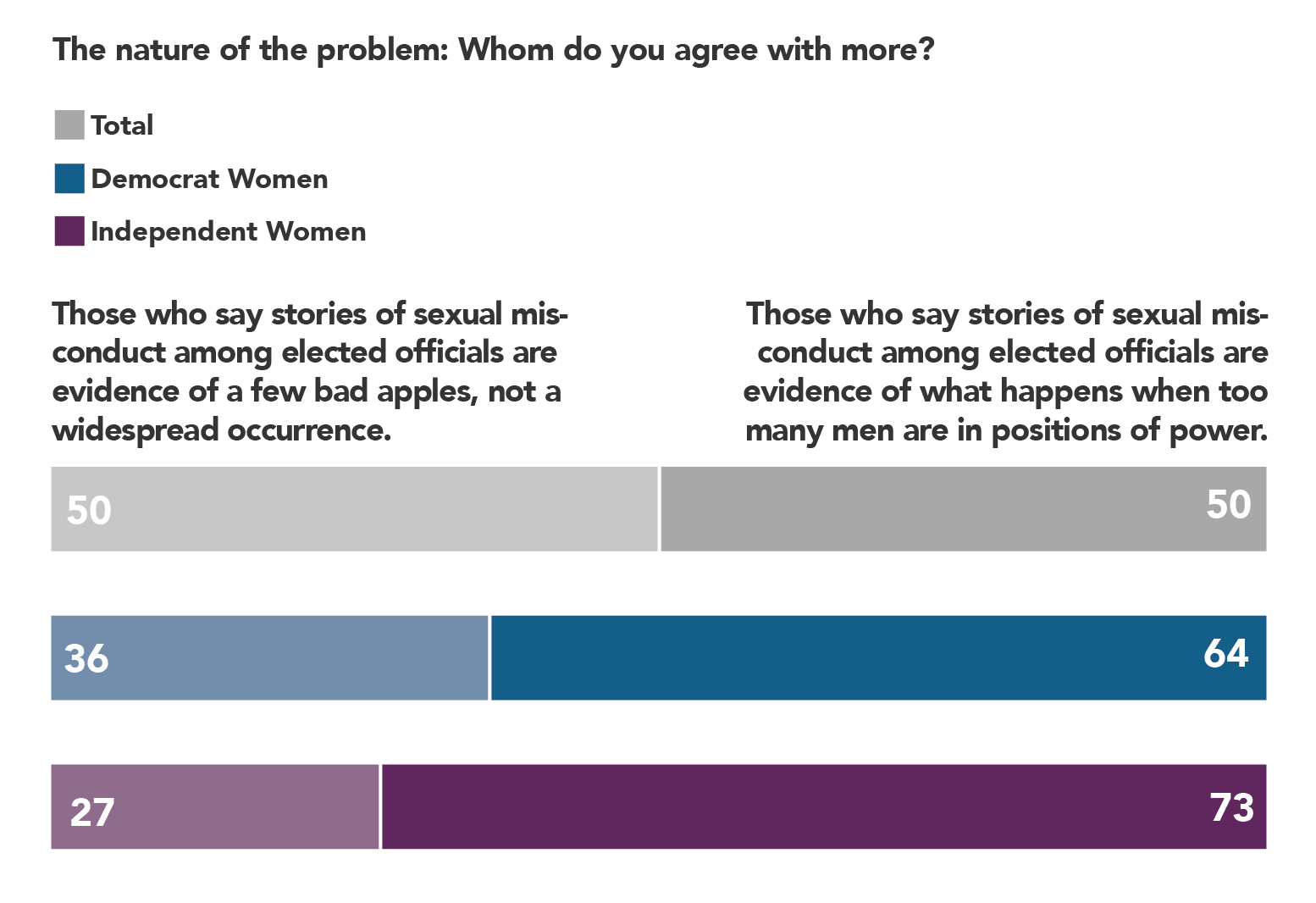
How to frame it
As with the Trump Cabinet scandals, one of the most troubling aspects of sexual harassment in Congress is the use of public money to pay for the settlements. Framing the settlements as a misuse of taxpayer money will connect with Americans.
As for possible solutions – Americans want members of Congress to get their own house in order. Establishing “internal zero tolerance policies that punish members who face credible allegations” is a popular step, as is publicizing sexual harassment disputes.
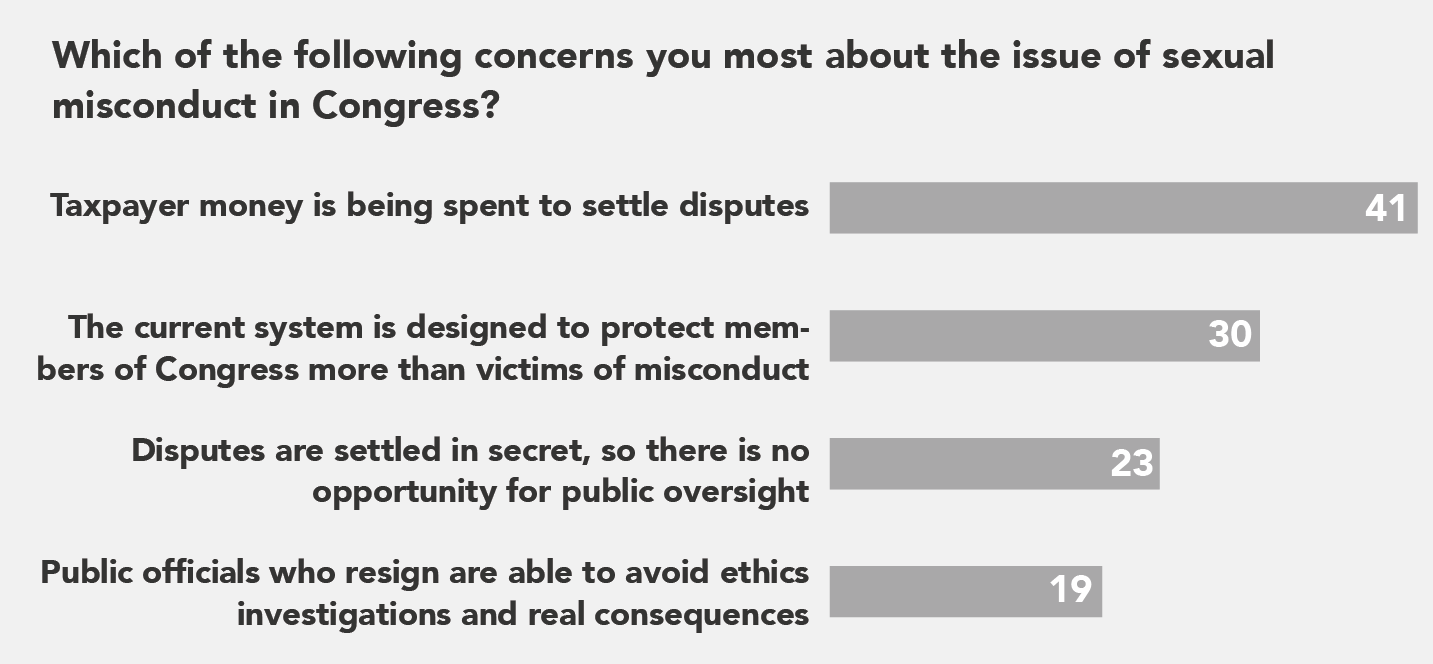
Bonus Points
One to watch: Michael Cohen
- In today’s polarized politics, most public figures have a floor of support that reflects the partisan die-hards who will support pretty much anyone on their side of the aisle. Not so for Trump’s longtime personal lawyer, Michael Cohen, who boasts a dismal rating even among Republicans: just 13% favorable to 43% unfavorable. With the general public, it’s even worse at 7% favorable to 50% unfavorable. He may not be the best known of Trump’s associates, but he may have the fewest defenders.
CorruptionWatch
- Donald Trump campaigned on draining the D.C. “swamp” of corruption, but by a 60% to 40% margin Americans believe he’s doing just the opposite – and bringing even more corruption to Washington.
- The sentiment defies pure partisanship, with two thirds (66%) of independents saying Trump is worsening corruption rather than fixing it.
Potential allies on guns: parents
- While the leaders of the post-Parkland push on gun violence prevention have been students, their parents are also an important constituency.
- According to the latest Navigator survey, parents with children under 25 years old and non-parents are equally likely to identify as Democrats (42%), and parents are slightly more likely to identify as Republicans (36%, compared to 34% for non-parents). But parents are much less sympathetic to the NRA: 65% have an unfavorable opinion of the organization, and just 28% have a favorable opinion. For non-parents, the split is 38% favorable to 52% unfavorable.
Words to use about Trump
- People have a lot to say about the president. This month’s survey dug into different frames for Trump to tease out the specific words to use when making a critique.

